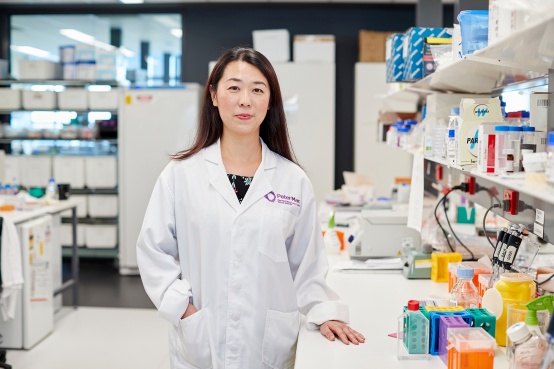
- Details
- Written by: Naomi Harrison
- Category: News
- Hits: 129
Dr Clare Slaney and her team are exploring using COVID-19 immunity to treat breast cancer.

They are working on ways to improve chimeric antigen receptor (CAR) T therapy, a type of immunotherapy, with funding support from the National Breast Cancer Foundation.
While CAR T therapy has shown great promise in some blood cancers, to date, it has not proved to be as effective for solid tumours like breast cancer. The opportunity that this research presents is identifying a mechanism capable of generating CAR T cells using COVID-19 viral specific T cells that already exist in most people after the pandemic.
As most of the world now have COVID-19 specific ‘memory T cells’ through exposure to the SARS-COV2 virus or through vaccination, this presents a new opportunity to engineer these immune cells to recognise and fight breast cancers.
Dr Slaney and her team from Peter Mac/University of Melbourne will collect COVID-19 memory T cells from people who have been infected and/or been vaccinated against COVID-19. By re-engineering these cells to recognise specific breast cancer surface proteins, these T cells could be used to fight breast cancers. Because these T cells already recognise the COVID-19 virus spike protein, they can be activated by a COVID-19 vaccine.
“The initial idea came to me as I was sitting at home frustrated in the early stages of the pandemic, unable to access my lab, watching my colleagues in infectious diseases working so hard to fight the SARS-COV2 virus. I suddenly thought can we leverage this virus to do something useful," Dr Slaney said.
"When the COVID-19 vaccines emerged, I had the idea that we just might be able to use COVID-19 immunity and vaccines to fight breast cancer. The early indications have been extremely promising, and I am so grateful that NBCF is supporting novel research like mine.”
Watch the story on 7 News
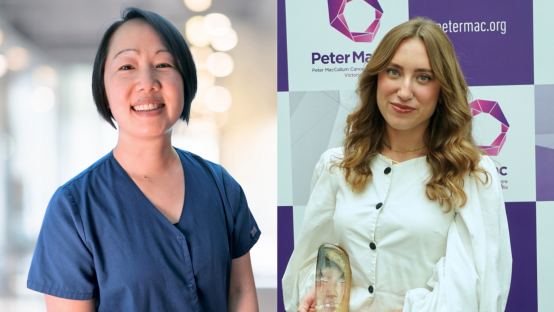
- Details
- Written by: Naomi Harrison
- Category: News
- Hits: 150
Peter Mac’s prestigious Lea Medal this year goes to both Dr Katie Fennell and Dr Annette Lim.

Awarded every year since 2017, the Lea Medal recognises exceptional female leaders in their early to mid-career at Peter Mac and provides financial support for their ongoing career development.
The Lea Medal is Peter Mac’s response to historic gender imbalances in the fields of health and science, which has seen fewer women reach senior positions or do so later than male peers.
Dr Laura Forrest and Dr Lorey Smith co-chair Peter Mac’s Research Gender Equity and Diversity Committee and are past recipients of the Lea Medal. They say it provides a welcome boost at the right time.
“Peter Mac has many outstanding women whose research is at the cutting-edge and is advancing our understanding of cancer and improving outcomes for patients,” Dr Smith says.
“While the professional environments we work in are increasingly free of the discrimination and structural biases that previous generations faced – many still remain and there’s a catch-up underway when it comes to seeing equal representation across each layer of the workforce.
Dr Forrest adds: “The Lea Medal seeks to address this and is an example of Peter Mac’s leadership in this space.”
Named after the Latin word for “Lioness”, the Lea Medal is generously funded by the Peter MacCallum Cancer Foundation.
This years’ Lea Medal recipients will each receive $50,000 to be spent on initiatives that advance their careers, including attending international scientific conferences and training opportunities.
Announced this week to mark International Women’s Day, our latest Lea Medal recipients are:
Dr Katie Fennell – Postdoctoral Researcher
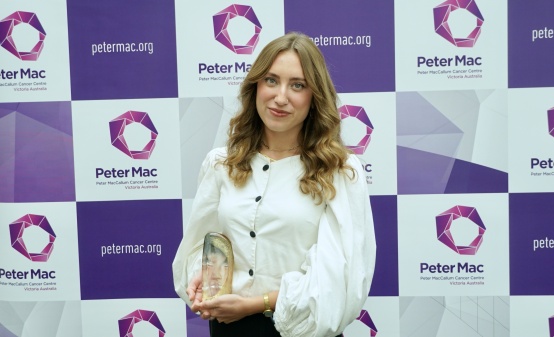
Dr Fennell is an early-career scientist whose research is focussed on improving understanding of how cancers spread and develop resistance to treatment.
Work from her PhD has been published in top tier scientific journals, including Nature and Nature Communications and she was a finalist for the prestigious Premier’s Award for Health and Medical Research in 2022.
She is currently investigating novel regulators of plasticity in cancer.
“My research focuses on investigating the process of cellular plasticity which plays an important role in mediating drug resistance and metastasis in cancer,” Dr Fennell says.
“By identifying the molecular mechanisms underlying this plasticity, we can develop novel strategies to prevent cancer relapse, with the goal of improving the outcomes of patients in the future.”
Dr Fennell will use her Lea Medal funding to help cover lab costs to advance her research. She also plans to attend the Advanced Sequencing and Bioinformatics Course at Cold Spring Harbour Laboratories in New York, and to present her findings at an international cancer conference.
Dr Annette Lim - Head and neck medical oncologist and clinician researcher
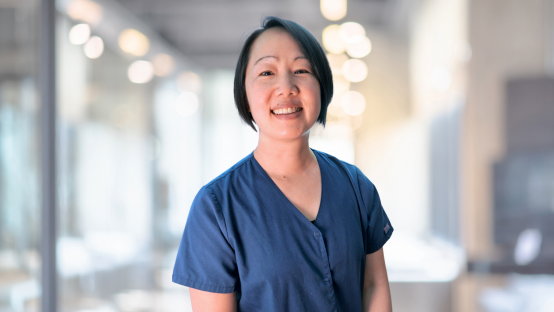
Dr Lim is a clinician scientist meaning she both directly treats patients (with head and neck cancers, non-melanoma skin cancer and thyroid cancer) and is involved in clinical trials and lab-based research.
Her research is focussed on one of the most common skin cancers worldwide - cutaneous squamous cell carcinoma (cSCC).
“My research aims to identify molecular biomarkers to help predict which patients with cSCC will respond to immunotherapy,” Dr Lim says.
“Immunotherapy has dramatically changed clinical practice and even in the metastatic setting has been able to achieve durable, long-term cancer control and improvement in patient quality of life.
“My research aims to identify key cancer features that will enable us to choose the right patient for immunotherapy upfront.”
Dr Lim will use her Lea Medal funding to perform novel RNA sequencing with the aim of describing molecular processes that underpin treatment response, and resistance, in cSCC patients.
All Lea Medal recipients are:
2017 – Dr Kylie Gorringe (Sole recipient)
2018 – Dr Marliese Alexander (Highly commended: Dr Elaine Sanij)
2019 – Dr Laura Forrest (Highly commended: Dr Elizabeth Christie)
2020 – Dr Anna Trigos (Highly commended: Dr Pilar Dominguez)
2021 – Dr Lorey Smith and Dr Jacqui Frowen (Dual recipients)
2022 – Dr Michelle Yong and Dr Junyun Lai (Dual recipients)
2023 – Dr Katie Fennell and Dr Annette Lim (Dual recipients)
Contacts:
For more information, or to arrange an interview contact the Peter Mac Communications team on 0417 123 048.
About Peter Mac
Peter MacCallum Cancer Centre is a world-leading cancer research, education and treatment centre and Australia’s only public health service solely dedicated to caring for people affected by cancer.
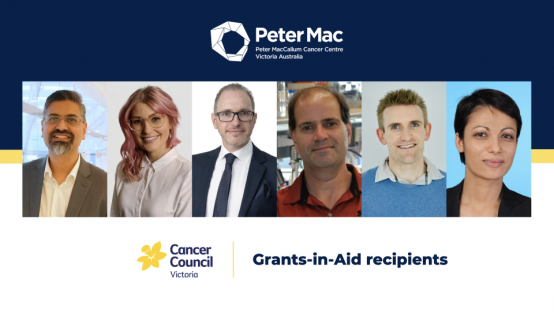
- Details
- Written by: Naomi Harrison
- Category: News
- Hits: 82
Three Peter Mac research projects have successfully won grants under Cancer Council Victoria’s Grants-in-Aid program.

The prestigious Cancer Council Victoria (CCV) Grants-in-Aid program will fund $3.3 million in high-quality research exploring the causes, prevention, diagnosis and treatment of all cancer types.
The three successful Peter Mac projects include analysing “liquid biopsies” to improve prostate cancer, enhancing function and persistence of CAR T cells for cancer therapy, and improving cancer immunotherapy.
Read more about each project below.
Analysing “liquid biopsies” to improve prostate cancer (2023-2025)
Associate Professor Arun Azad, Dr Heidi Fettke, Professor Michael Hofman, Dr Tu Nguyen-Dumont
This research aims to identify which prostate cancer patients will benefit most (and least) from Lu-PSMA treatment, in order to improve patient selection. In this world-first study, researchers aim to uncover resistance mechanisms to Lu-PSMA to define future novel combination strategies in clinical trials.
“Prostate cancer kills more than 375,000 people globally every year, including more than 3,000 in Australia alone,” Associate Professor Azad said.
“This work will ultimately optimise and improve the efficacy of Lu-PMSA, resulting in better outcomes for men with advanced prostate cancer.”
Click here for the full project summary.
Enhancing function and persistence of CAR T cells for cancer therapy (2023-2025)
Professor Phillip Darcy, Associate Professor Paul Beavis
The aim of this project is to improve the effectiveness of immunotherapies on solid cancers by validating a novel CRISPR/Cas9 HDR gene-editing approach for CAR T cells.
“I have several family members and close friends who have been diagnosed with cancer or passed away from the disease,” Professor Darcy said.
“This has always driven my motivation and desire to work on improving the effectiveness and safety of new treatments for cancer.”
Click here for the full project summary.
Improving cancer immunotherapy (2023-2025)
Professor Axel Kallies, Associate Professor Shahneen Sandhu
The aim of this project is to characterise the cells responsible for mediating anti-tumour immunity, understanding the pathways that regulate the abundance and function of these cells, and targeting them to improve cancer therapies.
“My vision is to translate our cutting-edge research based on preclinical models of cancer to improve patient outcomes,” Professor Kallies said.
Click here for the full project summary.
A further two Peter Mac researchers are collaborating on additional projects awarded CCV grants. Associate Professor Shahneen Sandhu is working with the University of Melbourne to improve cancer immunotherapy, while Dr Dineika Chandrananda is partnering with Monash University on a project involving ctDNA to monitor non-genomic evolution on Peripheral T-cell lymphoma.
Peter Mac is proud to receive three out of the 13 Grants-in-Aid programs available in 2023 and look forward to advancing our management of cancer with this funding.
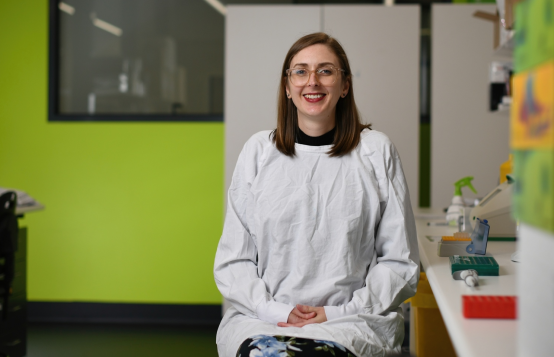
- Details
- Written by: Naomi Harrison
- Category: News
- Hits: 74
A world-first, international study led by researchers at Peter MacCallum Cancer Centre has identified why ovarian cancer becomes resistant to treatment in some people, paving the way for new techniques to treat the deadly cancer.

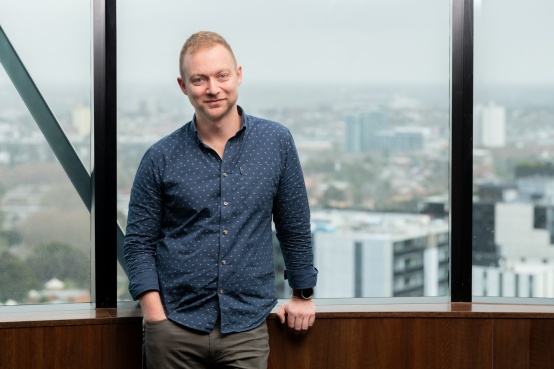
- Details
- Written by: Naomi Harrison
- Category: News
- Hits: 80
Professor Ben Hogan, fundamental researcher at Peter Mac and Department of Anatomy and Physiology at Melbourne University, has joined with international experts to highlight the importance of funding basic research in this month’s Nature Cardiovascular Research.

Professor Hogan, Dr Mark Kahn from the University of Pennsylvania and Professor Natasha Harvey from the University of South Australia said “fundamental discovery science has driven innovation and outcomes in cardiovascular medicine for decades, yet funding support in Australia has decreased 23 percent overall between 1992 and 2018.
“The way physicians treat patients with cardiovascular disease today is a direct result of the extensive knowledge gained through fundamental research that spanned generations of researchers,” they said.
Professor Hogan and his co-authors said fundamental research has played a key role in developing new knowledge that has led to changes in medicine and clinical practice over the years.
“Not funding the entire research pipeline from discovery science to clinical translation may have long term costs in the health space,” they said.
“We need fundamental research to provide the seeds for the next major crop to bring about new knowledge and changes to medicine.”
You can access the Nature Cardiovascular Research commentary here.
Contacts:
For more information contact the Peter Mac Communications team on 0417 123 048.
About Peter Mac
Peter MacCallum Cancer Centre is a world-leading cancer research, education and treatment centre and Australia’s only public health service solely dedicated to caring for people affected by cancer.
